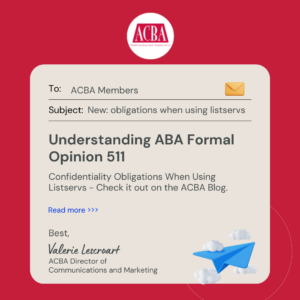The American Bar Association (ABA) has recently issued Formal Opinion 511, which provides essential guidance on confidentiality obligations for lawyers participating in listserv discussions. This opinion underscores the importance of protecting client information and offers specific directives for ensuring compliance with ABA Model Rule 1.6. As members of the Alameda County Bar Association (ACBA), it is crucial to familiarize ourselves with these guidelines to maintain the integrity of our professional communications, especially on the ACBA listserv.
 Key Points of ABA Formal Opinion 511
Key Points of ABA Formal Opinion 511
1. Prohibition on Disclosing Client Information Without Consent Rule 1.6(a) of the ABA Model Rules of Professional Conduct prohibits lawyers from revealing information relating to the representation of a client without the client’s informed consent. This restriction applies even when lawyers discuss cases in hypothetical or abstract terms if there is a reasonable likelihood that someone could infer the client’s identity or the situation involved.
2. Hypotheticals and Client Identity Even anonymized or hypothetical scenarios discussed on a listserv can pose risks. If the details shared could reasonably lead someone to deduce the client’s identity or the specific situation, such disclosures are prohibited without the client’s informed consent.
3. Acceptable Listserv Participation Lawyers are permitted to engage in discussions on legal news, recent decisions, or changes in the law without client consent, provided these contributions do not disclose any client-related information. Such participation can include seeking general advice, sharing legal insights, or discussing procedural developments without referencing specific cases or clients.
Why This Matters for ACBA Members
Participation in listservs is a valuable tool for professional development and collaborative problem-solving. However, maintaining client confidentiality is paramount. Opinion 511 serves as a reminder to carefully consider the content of our communications on listservs to ensure compliance with ethical standards.
Practical Steps for Compliance
- Seek Client Consent: Before sharing any details that could relate to client representation, obtain explicit informed consent from the client. Explain the potential risks and obtain an affirmative response.
- Use General Inquiries: Frame your questions in a way that they do not reference specific client details. For example, instead of discussing a unique case scenario, ask about general legal principles or procedures.
- Avoid Identifiable Information: Be mindful of the context and details you share. Ensure that your posts do not inadvertently reveal client identities or sensitive case information, even indirectly.
- Review and Revise Drafts: Before posting to a listserv, review your message to strip out any potentially identifying information. When in doubt, err on the side of caution.
Encouragement to ACBA Members
We encourage all ACBA members to read and adhere to the ABA’s Formal Opinion 511. By doing so, we uphold the ethical standards of our profession and protect the confidentiality of our clients. Engaging thoughtfully in listserv discussions not only benefits our professional community but also reinforces the trust our clients place in us.
For more detailed information, you can access the full text of ABA Formal Opinion 511 here.
Let’s continue to use our listservs responsibly and ensure that our discussions are both enriching and ethically sound. By following these guidelines, we can all contribute to a professional, respectful, and confidential environment in our communications on the ACBA listserv.
